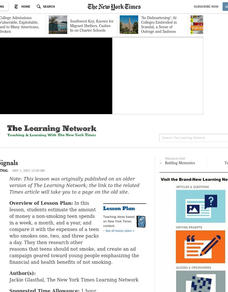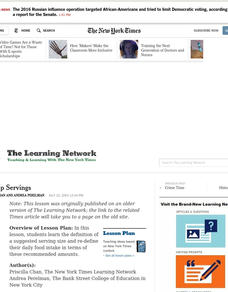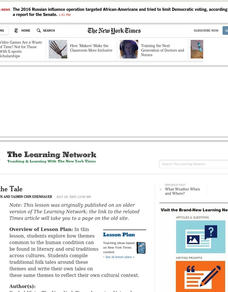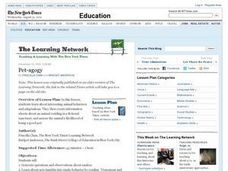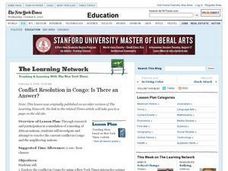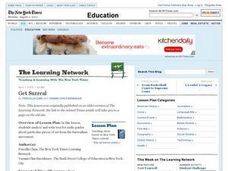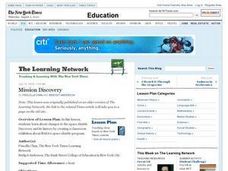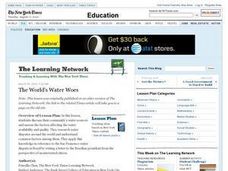Curated OER
Rights-Minded
Students expand their knowledge and understanding about the civil rights movement by investigating the lives of some of the people who contributed to it.
Curated OER
Smoke Signals
Learners estimate the amount of money a non-smoking teen spends in a week, a month, and a year, and compare it with the expenses of a teen who smokes one, two, and three packs a day. They research other reasons that teens should not smoke.
Curated OER
Isn't It Ionic?
Students research the properties and health risks of organic chemical solvents. They create a Safety with Solvents newsletter to share with others in their school and community.
Curated OER
Reporter's Notebook
Students research the geography and history of a major city in Iraq. They write a journal from the perspective of a war correspondent stationed in that city.
Curated OER
Unionized We Stand
Learners compose a statement of basic rights to protect their own health and well-being. They research the history, power and purpose of unions in the United States before creating their own union to promote the interests of students.
Curated OER
Government Gripes
Students, in groups, investigate the purpose and jurisdiction of government agencies assigned to regulate different science/technology/health issues, then describe situations in which agencies might have a disagreement, and stage a mock...
Curated OER
A Sea-nic Perspective
Students brainstorm topics related to the health of our world's oceans. They create presentations about specific issues affecting oceans for display in a classroom exhibit. They write letters of invitation to guests to view the exhibit.
Curated OER
Sizing Up Servings
Students learn the definition of a suggested serving size and re-define their daily food intake in terms of these recommended amounts.
Curated OER
To Tell the Tale
Students explore how themes common to the human condition can be found in literary and oral traditions across cultures. They compile traditional folk tales around these themes and write their own tales to reflect their own cultural context.
Curated OER
A Doctor's Dilemma
Students consider the bioethical dilemmas faced by doctors and write case studies about relevant issues within a particular medical decision.
Curated OER
Pet-agogy
Students explore interesting animal behaviors and adaptations. They create information sheets about an animal residing in a fictional sanctuary and assess the animal's likelihood of being a good pet.
Curated OER
Confronting College
Learners investigate what they need to meet their future academic goals, then investigate the college admissions process by preparing materials for a mock college fair.
Curated OER
Working Like a Dog
Students consider ways animals help human beings with certain chores, then research more specific tasks dogs are trained to do. They create a help wanted ad enumerating the traits a dog should have before applying for a particular position.
Curated OER
Sea No Evil
Students research the characteristics of marine life at different ocean depths. They use their findings as the basis for a classroom 'Life Under the Sea' museum exhibit.
Curated OER
Rhythm Nation
Students read a New York Times article to help them develop an understanding of the history, development, and social influence of various types of world music through the creation of music museum exhibits.
Curated OER
Conflict Resolution in Congo: Is There an Answer?
Students research and participate in a simulation of a meeting of African nations. They investigate and attempt to resolve the conflict in Congo and the neighboring nations.
Curated OER
Coming to Terms with the Past
Students explore Holocaust survivor Simon Wiesenthal. They conduct research to examine how the post-Holocaust period has been handled historically and hold a teach-in to promote continued awareness of the Holocaust's impact.
Curated OER
Get Surreal
Learners analyze and write text for audio guides about particular pieces of art from the Surrealism movement.
Curated OER
Mission Discovery
Students examine the changes to the space shuttle Discovery and its history by creating a classroom exhibition about NASA's space shuttle program. They create an informative and attractive invitation about the gallery for outside visitors.
Curated OER
Plastic Peas
Students consider the life cycle of certain plastics products and propose improved recycling legislation in their own communities.
Curated OER
The World's Water Woes
Students discuss their community's water sources and assess the factors affecting the water availability and quality. They research water disputes around the world and explain common factors among them.
Curated OER
Deadly Diseases
Students consider the social, political, environmental, economic, medical and other considerations for why particular countries experience outbreaks of certain infectious diseases.
Curated OER
Artscapes
Students consider "The Gates" and other environmental art projects, and create an original public art project for their local community. They draw sketches and write proposals outlining their ideas.
Curated OER
Fruitful Questions
Students examine a fruit-related Q & A Science Times article. They write their own food science questions and answer them in the same format as the article. For homework, they analyze their fruit consumption according to U.S....



